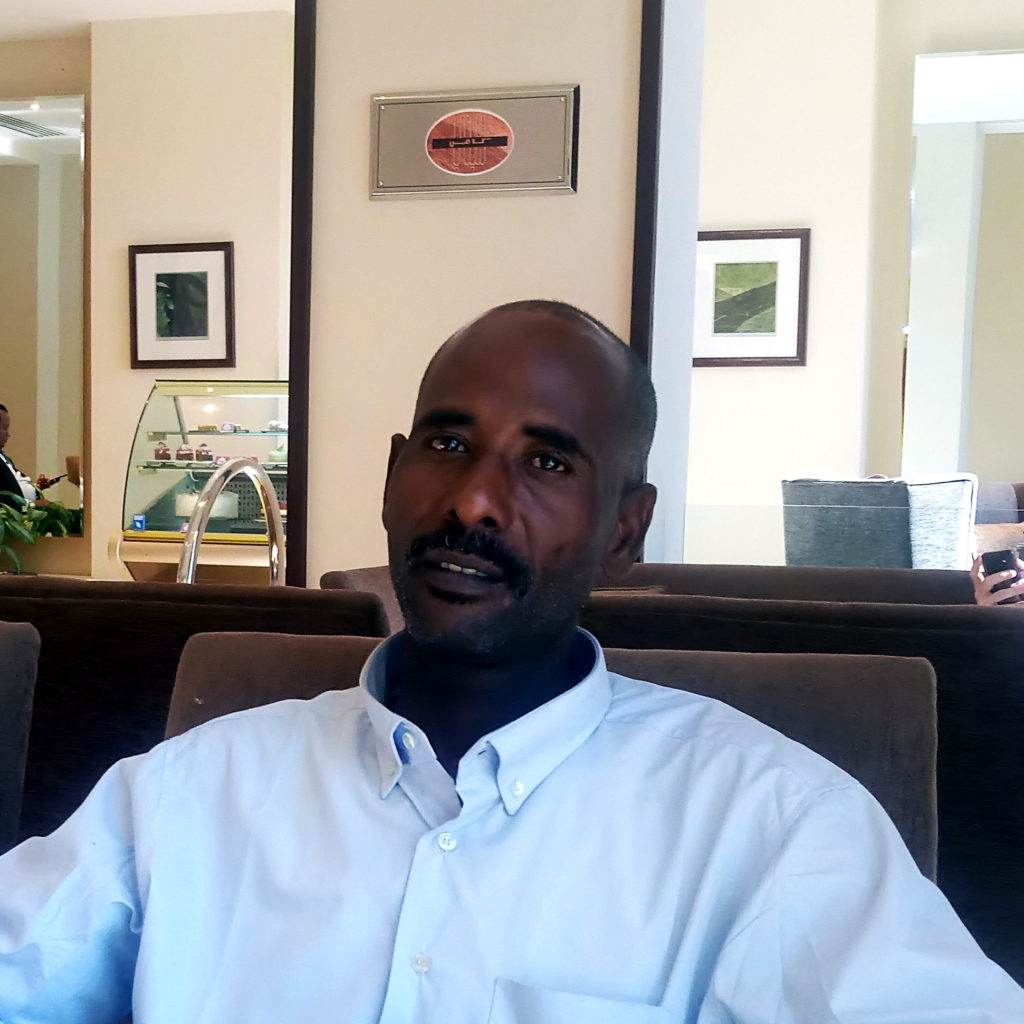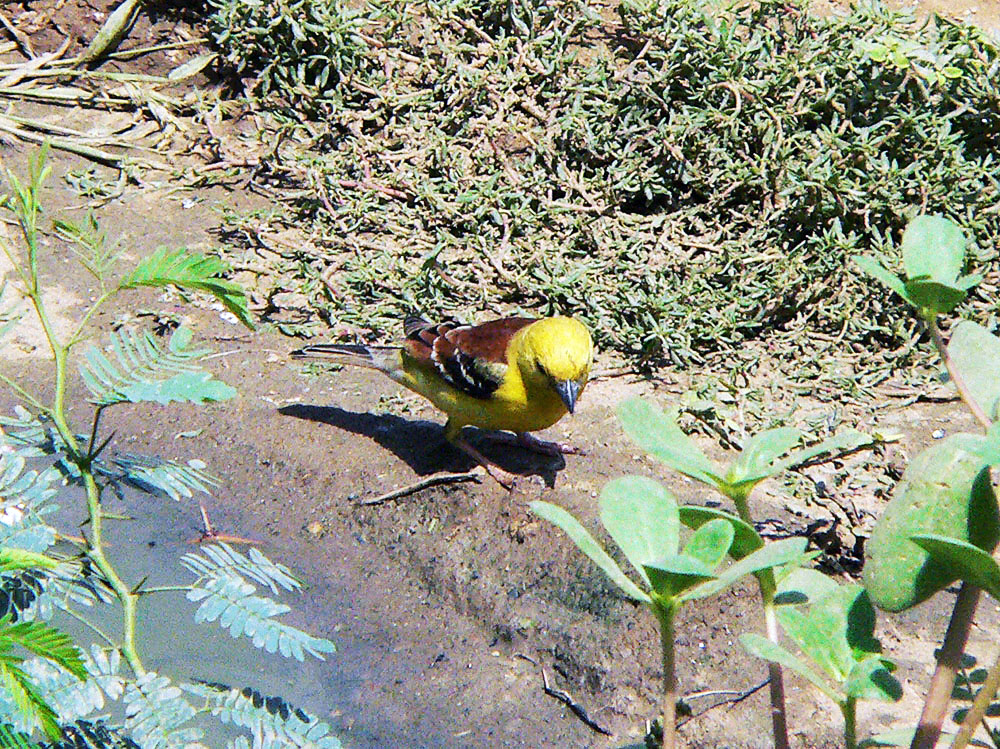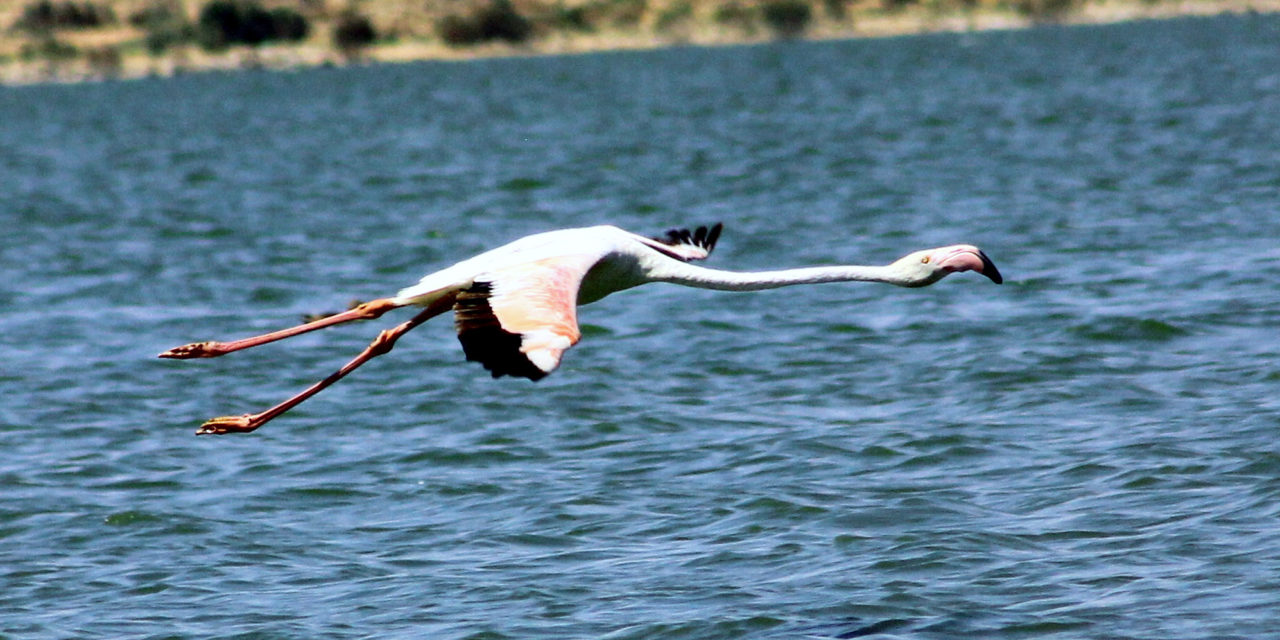A Flamingo photographed in Wadi Halfa, Sudan.
(cc) worldmigratorybirdday.org
Awad Mohamed is passionate about birding. For over 10 years he has been documenting Sudan’s birds with little support. With a new government in place, Awad is hopeful that birds and his birdwatching club will receive more attention.
Years of violent conflict has burdened wildlife in Sudan, with many animals killed directly by shooting, or by overhunting of combatants who used them as a primary food source. Additionally, Africa is powering up rapidly. Governments’ urge to develop economically and attract investments is immense. This push also involves Sudan, where millions of migratory birds could be dying due to electrocution and collisions with electricity cables in an expanding power sector.
Although more than 90 percent of Sudan’s area is classified as desert and semi-desert ecosystems, it is still rich in biodiversity, thanks to its forests – which make up 12 percent of its territory – and wildlife adjacent or connected to the Nile and its streams, as well as the Red Sea. Sudan is not a country where one will see the huge range of species on offer in East Africa, but the Nile, which flows through the capital Khartoum, is a major migration corridor that provides a good range of species. Thus, there is plenty to observe for a keen birdwatcher.
“I started photographing the birds out of curiosity.”
Awad Mohamed
One such birdwatcher is Awad Mohamed. “I had the idea back in 2009, triggered by a widely spread rumor that migratory birds coming from western countries carry spying devices on them. So I started photographing the birds out of curiosity,” he explains. “They only had tags with information for research purposes, but at that point I was already deeply interested in the birds themselves and began to study them.”
“I began to do research about migratory birds in Sudan, learning about where they come from and go to, their features, seasons of migration, their settlement time and much more. As I kept on documenting, I gathered a lot of data. I wanted to share this information with the public to enlighten people about the birds in Sudan,” explains Awad.
Awad has a background in photography and filmmaking. He shot films to make ends meet and in his free time he documented birds. “I didn’t receive any funds for my project, so I would choose assignments in the places where birds are to balance between my job and my passion,” he says. “Birds for me are the most prioritised beings to be protected and documented.”
“I basically study the birds, which in turn tells me about the problems in the areas of retreat. Birds protect biological balance, and any problem in this chain can have major effects,” Awad says, adding that even the country’s economy can be affected, as some of those birds feed on insects which are likely to destroy crops.

Little reliable data
Sudan is home to a number of species of birds that vary from residents, that stay all year round, to breeding birds, that spend a good part of the growing season in Sudan to raise their young, migrants who pass through Sudan with the seasons, to wintering birds who spend a good part of the winter in Sudan to escape colder conditions up north. However, years of violent conflict have made it difficult to gather consistent reliable data. “Sudan is the only African country that has no statistics for birds or a bird-watching club,” says Awad.
In 2016 Awad seized the first opportunity to present his work to a larger audience. “I held my first exhibition in 2016 which contained 268 photographs that I gifted to the Wildlife Conservation Administration. They sponsored the event and made the data about settled and migratory birds in Sudan publicly available. I gathered the data for the exhibition for almost six years, from 2010 to 2016.”
Awad started the first bird-watching club in Sudan soon after the exhibition to “highlight the importance of bird conservation”. He says he was inspired by other African birdwatching clubs. Soon after the establishment of the club, Awad held a workshop to introduce the basics of birdwatching. His goal was to give people the chance to experience and learn about birdwatching, hoping they would carry on with it.
But the club was facing many issues to go further, as no official entity or NGO stepped up to sponsor the club’s efforts. In view of the multitude of challenges the people of Sudan were facing, birds and birdwatchers weren’t high on the agenda. For example, Awad explains, a “challenge was the lack of logistic aid to go to the field sites as most of them are located far from the capital”. “My main focus on getting sponsorship was approaching local organisations and governmental institutions, but I didn’t receive encouraging responses.”
“I wanted to print a guide about the birds of Sudan.”
Awad Mohamed
“Unfortunately the club didn’t receive the attention I hoped for, despite its goal of establishing a reliable database for researchers, students and tourists. I wanted to print a guide about the birds of Sudan that holds updated statistics about the population of birds within the current borders of the country, in addition to photographs.”

Moving towards a new era
Nonetheless, Awad continues to gather data. “During all my trips, I had GPS with me in order to create an accurate bird-map. My data includes about 300 bird species, their environments for recreation, local names beside the English and scientific name, in addition to photographs of each bird.”
He keeps the data available for anyone interested and hopes to one day be approached by an institution or organisation that helps the club to thrive, especially now with all the changes in Sudan. “I have high hopes for the future and I can see some changes already in the country and that gives me great hope for the future.”
During his work, Awad witnessed the plight of birds. He says that widespread violence across the country played a major role in destroying Sudan’s ecosystems and biodiversity. “Wadi Hawar and other retreats had become unavailable for migratory birds as stops during their journey due to conflicts, and that changed their route which affected the environment in those areas and disturbed the biodiversity among other issues.”
With the political transition in progress, Awad hopes violence will cease, allowing Sudan’s ecosystems to rejuvenate. Awad is also optimistic about the future of bird research in Sudan and his birdwatching club. “I hope now that we are moving towards a new era, Sudan will establish a reliable database and sponsor the activities of the birdwatching club in addition to update national statistics.”

